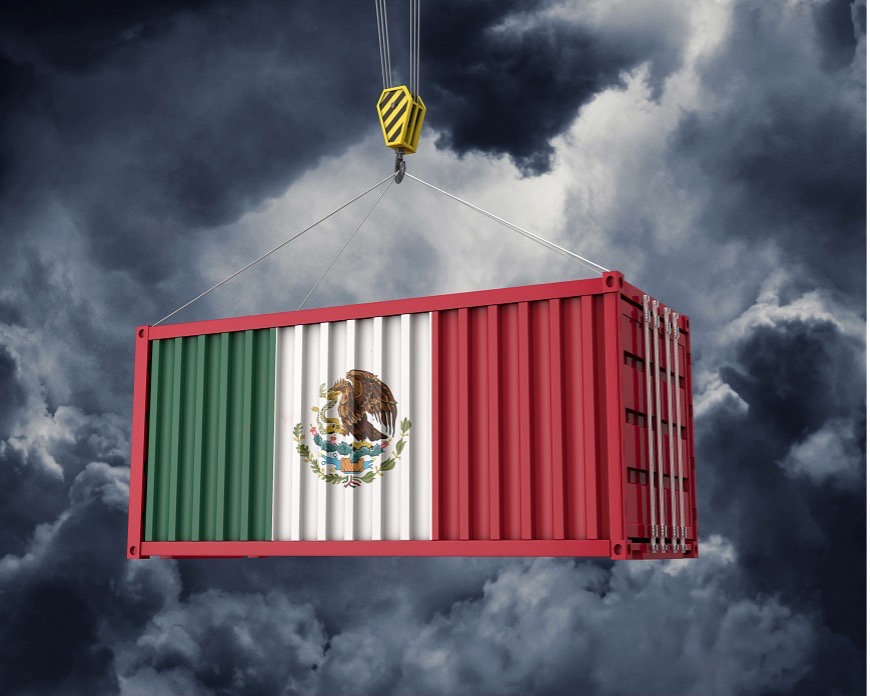By Brenda Cordova, Braumiller Law Group Mexico Legal Counsel
Recently, US elected President Trump threatened that when he takes office one of his first orders will be a 25% import duty on all goods coming from MX into the US. The intention is to put pressure on Mexico to stop the flow of illegal drugs and immigrants.
Soon thereafter, during her morning brief (“Mañanera”), the new MX President, Claudia Sheinbaum, with the help of the MX Minister of Economic, Marcelo Ebrad, presented an outlook as to what such an import duty would imply.
Generally, Ebrad began his presentation by explaining two important precedents in the US, one implemented in the US during the 1930´s which resulted in many problems such as a trade war and reduced trade. He also spoke about the 10% import duty imposed in 1970 by President Nixon to all imports into the US – this was aimed to negotiate exchange rate policy changes with the US trading partners. This measure resulted in an immediate increase in the price of goods imported into the US as well as a reduction in the purchasing power of US consumers. Since the US was not able to sustain this, this measure lasted 4 months approx.
Ebrad stated that the 25% import duty announced by President Trump will result in a negative economic impact. First, the 25% is obviously higher compared to the 10%, and also during 1971, US imports represented 3.4% of the country´s Gross Domestic Product which was less than the current 12.7% of GDP (this is 4 times more than in 1970).
He also noted that the 25% import duty would affect the largest MX exporters which are mainly US companies, particularly in the automotive industries, such as GM, Stellantis and Ford. These companies are part of trade integration producing an impressive number of vehicles. They have been operating in Mexico for a long time (i.e. GM over 80 years and Ford almost a century). Thus, when Trump announced that it will impose an import duty to MX exporting to the US, it is basically announcing the import duty will be imposed on the most important US companies located in MX. If in response MX were to impose similar import duties, this would also affect these 3 companies and others. Ebrad noted that this would be like “shooting oneself in the foot”.
Ebrad also pointed out that the import duty in addition to affecting the US consumer, will also affect companies. First, it could duplicate the income tax paid in the US by companies because the 25% will be on top of what they are already paying (21%). This could result in 400, 000 employees in the US being at risk. Also, 88% of pick-ups sold in the US are produced in MX mainly by Ford, Stellantis and GM, and the 25% import duty could result in a $3000 USD increase on the price of pick up when sold in the US. These estimates are based on information recently shared by the automotive and auto parts industry with the Minister of Economy.
Regarding the above, Ebrad mentioned that Sheinbaum wants to present to the new US administration the vision to make North America a safer, more productive and competitive block in the world. This is relevant because numbers show that between January through September, 2024, the intraregional trade between the US, CA, MX, was 1776.5 USD billion. This is almost 30% of the GDP worldwide.
Based on the above the MX government presented these two options:
- Segregate and divide the region by accusing the government and imposing retaliatory duties. Nonetheless, this will weaken regional economies. Because if an import duty is imposed on MX, then in response, MX or CA could impose the same which can result in an endless division of the North American Region, or
- Together build a strong, competitive and more prepared region to lead the future and compete with other regions.
Ebrad finalized his presentation by stating that Mexico’s proposal is to stay with the second option which is to build a stronger region as follows:
- Regional Stability. This can be achieved by MX, CA and the US when cooperating in security, immigration, governance, and other topics, to guarantee a trustworthy and safe region.
- Shared Prosperity as a common objective of the US, CA and MX. Anything against, such as unnecessary duties, increased costs, making production more complex, etc. will not work.
- Global Competitive. Duties pull apart an integrated industry
During the second part of the “Mañanera”, Sheinbaum also announced the creation of the Consejo Asesor de Desarrollo Económico Regional y Relocalización, CADERR (Translated as Regional Economic Development and Business Relocation Advisor Council), which is comprised by 15 representatives and business leaders from different industry sectors from private industry. Together and in coordination with educational institutions, various organizations, chambers of commerce will collaborate with the MX government to create the “Plan Mexico” aimed to strengthen country development and support private investment and regional development. CADERR will also advocate against the imposition of import duties affecting US, CA and MX companies.
MX´s vision seems to be a reasonable proposal for the benefit of the USMCA region. Nonetheless, we need to wait and see how the exchange of opinions and communication flows between MX and the US for the above purposes. Truth is MX and the US have built one of the most important industrial and technological clusters worldwide in terms of well paid jobs, trade of goods, services, foreign direct investment. The only way to continue with a prosperous regional growth for the benefit of everyone in the North American region is to maintain and show respect to each other and work together towards the achievement of those goals.

